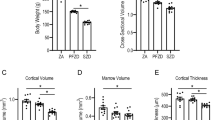Abstract.
The current studies were intended to assess dose- and time-dependent effects of dietary zinc (Zn) on alkaline phosphatase (ALP) activity and tartrate-resistant acid phosphatase (TRAP) activity in adult female mice. In the first study, mice were given 0, 1×, 2×, 3×, or 4× normal dietary Zn for 2 weeks, 4 weeks, or 6 weeks. In the second study, mice were given 0, 1×, 2×, 3×, 4×, and 5× normal dietary Zn for 4 weeks. Sera were collected for measurements of ALP and (in the second study) osteocalcin. Tibiae and calvaria were extracted for measurements of ALP, protein, and TRAP. The first study showed positive correlations between dietary Zn and serum ALP (4 and 6 weeks, P < 0.001), Zn and tibial ALP (2, 4, and 6 weeks, P < 0.03), and Zn and tibial protein (2, 4, and 6 weeks, P < 0.001), as well as a negative correlation between dietary Zn and tibial TRAP (2, 4, and 6 weeks, P < 0.001). Covariant analyses showed that serum ALP, tibial ALP, tibial protein, and tibial TRAP were affected by the dose of Zn (P < 0.005) and by the treatment time (P < 0.03). Supplemental studies showed that (1) the dose-dependent effect of dietary Zn on serum ALP (at 6 weeks) was proportional to the effects on tibial ALP and calvarial ALP, but not to the effects of Zn on renal, hepatic, or intestinal ALP; (2) 6 weeks of dietary Zn caused dose-dependent increases in ALP specific activity in the tibia, calvaria, and liver, but not kidneys or intestines; and (3) Zn increased ALP activity and cell layer protein and decreased TRAP activity in monolayer cultures of the murine osteoblastic cell line, MC3T3-E1. The second dietary study confirmed the results of the first: 4 weeks of treatment with Zn caused significant increases in serum ALP, calvarial ALP, and tibial ALP activities, and a significant decrease in tibial TRAP (P < 0.05–0.005 for each). This study also revealed an effect of Zn to increase serum osteocalcin (P < 0.03 at 2× normal Zn). Together, these data indicate that incremental increases in dietary Zn are associated with increases in ALP activity in serum and in bone. The effect of Zn to decrease TRAP activity in osteoblast-line cells precludes the interpretation of a Zn-dependent decrease in tibial TRAP activity as evidence of decreased bone resorption.
Similar content being viewed by others
Author information
Authors and Affiliations
Rights and permissions
About this article
Cite this article
Dimai, H., Hall, S., Stilt-Coffing, B. et al. Skeletal Response to Dietary Zinc in Adult Female Mice. Calcif Tissue Int 62, 309–315 (1998). https://doi.org/10.1007/s002239900437
Issue Date:
DOI: https://doi.org/10.1007/s002239900437




